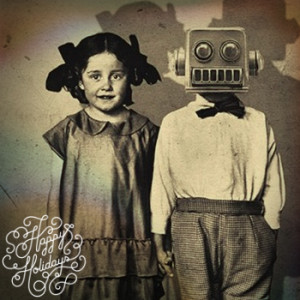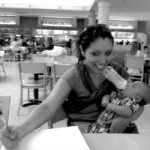 Bourbon and Milk is an ongoing series that dives into the perplexing spaces parenting sometimes pushes us, and explores the unexpected ways writers may grow in them. If you’re interested in joining the conversation or contributing a Bourbon and Milk post, query Giuseppe Taurino at: giuseppe [at] americanshortfiction.org.
Bourbon and Milk is an ongoing series that dives into the perplexing spaces parenting sometimes pushes us, and explores the unexpected ways writers may grow in them. If you’re interested in joining the conversation or contributing a Bourbon and Milk post, query Giuseppe Taurino at: giuseppe [at] americanshortfiction.org.
—
Welcome to the third annual holiday edition of Bourbon and Milk.
Once again, with a nod towards the thankfulness many of us associate with the holidays—a thankfulness steeped in both the warmth and the insanity of family—I asked five writer-parents to identify and write about “crappy” literary parents, and five non-parents to chime in on “exemplary” ones. This year’s group of writers, like previous years’, took my relatively rudderless prompts and transformed them into micro-essays filled with beauty, humor and anxiety, as they contemplated literary parents ranging from Abraham to the father in Junot Diaz’s Drown to William Burroughs.
To reiterate past holiday post intros: whether you have kids or not, aspire to birth a village, or plan to do your part to keep the world’s population in check, these brief meditations will, if nothing else, elicit a deeper appreciation for the clusterfuck that is parenthood—in all its decidedly gray incarnations.
Happy Festivus.
 I grew up at a time when we drove around in the back of my uncle’s station wagon unrestrained, the metal buckles of the seat belts tapping against one another with each sharp turn of the car. We never used helmets or kneepads when we rode our bikes. We wore flammable Halloween costumes and ate the lead laced candies my cousins would bring with them whenever they visited us from Tijuana. I first got drunk when I was five years old. By seven, I was stealing swigs of my older brother’s beer and taking drags from his lit Marlboros. Nobody thought this was odd. In fact, in our family, it was endearing. It got me attention, and if there was one thing I craved more than anything growing up it was attention. I’m telling you all of this, and you’re likely forming a picture of my mother in your head. A negligent monster, perhaps, a woman who let her children run around with reckless abandon. But the truth was that my mother was very good at what she did, all things considered. She migrated from Mexico to the United States by herself, raised eleven children under extreme conditions, and made the best tamales in all of suburban Los Angeles.
I grew up at a time when we drove around in the back of my uncle’s station wagon unrestrained, the metal buckles of the seat belts tapping against one another with each sharp turn of the car. We never used helmets or kneepads when we rode our bikes. We wore flammable Halloween costumes and ate the lead laced candies my cousins would bring with them whenever they visited us from Tijuana. I first got drunk when I was five years old. By seven, I was stealing swigs of my older brother’s beer and taking drags from his lit Marlboros. Nobody thought this was odd. In fact, in our family, it was endearing. It got me attention, and if there was one thing I craved more than anything growing up it was attention. I’m telling you all of this, and you’re likely forming a picture of my mother in your head. A negligent monster, perhaps, a woman who let her children run around with reckless abandon. But the truth was that my mother was very good at what she did, all things considered. She migrated from Mexico to the United States by herself, raised eleven children under extreme conditions, and made the best tamales in all of suburban Los Angeles.
Strong females loom large in my childhood memories. I had a whole host of aunts and older sisters around me, and each had a hand in shaping my perception of women and what feminine agency could look like. I didn’t have just one mother growing up. I had an entire household of them. As I grew, I watched these women closely. They loved men who cheated on them. They had children of their own. They fought one another. They remarried. They drank beer. They were devout Catholics and hardcore cholas. They were imperfect creatures, but they flaunted their imperfections.
There are many bad examples of far-from-perfect mothers in Susan Straight’s Highwire Moon. When Serafina, an undocumented Mixtec woman from Oaxaca, is deported back to Mexico, her daughter Elvia grows up in foster care, passed along from one home to another. In one, there’s a mother with “tongue-colored hair, where the many children [pinch] one another over individual Cheerios and [fight] about every hot dog.” In another, there’s a mother who cuts Elvia’s long braid, the only concrete memory she has of Serafina. Elvia’s father, Larry, tracks her down and takes her to live with him, his meth addicted girlfriend Callie and Callie’s son, Jeff. One night, a friend of Callie’s named Lee, a woman with children of her own, is cooking meth in her house when the whole place explodes; only one of her three kids survives the blast. Larry and Callie get deeper and deeper into drugs, Elvia steals her dad’s truck and, with her crazy boyfriend Michael (whose child she’s carrying) and Michael’s friend Hector, goes to Tijuana to search for Serafina. There’s more drug use, sex, lots of bad words, and many dead bodies. When the mayhem becomes too much for Elvia, she seeks out Sandy Narlette, the one kind foster mother she remembers as a kid. Sandy Narlette bakes cookies for the foster children she takes in and is a good mother to her own biological daughter named Rosalie. Sandy stitches their names onto their pillow cases and paints glittery nail polish on quarters and makes them believe these are from the tooth fairy. These children come to her damaged, from horrible homes with terrible parents who’ve beaten and abused them in ways that are difficult to imagine, let alone read. One night, when Elvia goes in search of Michael, Sandy follows her and tracks her down in a dry creek bed. She’s wearing a pair of Keds, a pair of faded jeans, and she’s armed with a flashlight and a can of pepper spray, ready to kick the living shit out of anybody looking to mess with her foster daughter. It’s that bond that goes beyond motherhood that Susan Straight manages to capture here, that primal instinct parents have for children that may or may not be their own that I admire so much, that calls me back whenever I think about human devotion and compassion of the highest and most sacred of orders.
Alex Espinoza is the author of Still Water Saints and The Five Acts of Diego León. His work has appeared in The New York Times Sunday Magazine, Los Angeles Times, Salon, Huizache, The Southern California Review, the American Book Review, the Virginia Quarterly Review, and on NPR’s “All Things Considered.” His awards include the Margaret Bridgman fellowship in fiction from the Bread Loaf Writers’ Conference, a 2014 fellowship in prose by the NEA, and an American Book Award. Alex is a visiting associate professor of English at Cal State Los Angeles and is at work his next novel.
 There’s a moment in Anne Carson’s Autobiography of Red when Geryon, a little boy, digs through his mother’s purse as she gabs on the phone. He finds a cigarette and some “pieces of crispy paper,” and starts gluing them to a tomato. His mother hangs up and studies his handiwork. “It’s beautiful,” she tells Geryon. “It’s a beautiful sculpture. Maybe next time, you could use a one-dollar bill instead of a ten for the hair.”
There’s a moment in Anne Carson’s Autobiography of Red when Geryon, a little boy, digs through his mother’s purse as she gabs on the phone. He finds a cigarette and some “pieces of crispy paper,” and starts gluing them to a tomato. His mother hangs up and studies his handiwork. “It’s beautiful,” she tells Geryon. “It’s a beautiful sculpture. Maybe next time, you could use a one-dollar bill instead of a ten for the hair.”
I was nineteen when I read this, and not yet a mother (I’m still not). But even then the moment struck me as a sly display of parental grace. Geryon’s mom is no saint: she chain-smokes, serves canned peaches for dinner, and is oblivious to dangers brewing in her home. But here—as Geryon shreds her dwindling cash—she shows clear vision for what’s important. She plays along. She transfigures her annoyance into something a child can understand. What results is an unbroken message of respect.
Respect: it forms a thin but vital line. Geryon’s mom doesn’t scold (That’s my cash!) because she knows that money means nothing to him. And she doesn’t indulge him (That’s adorable, here’s a twenty) because that would compromise herself. Instead she speaks her mind (Next time, use a one-dollar bill) while honoring her son’s imagination and necessary imperfection.
These gestures of respect accrue into something mighty: her lifelong guidance of Geryon not toward flawlessness, but toward becoming more exquisitely the person that he already is. This proves critical as he matures—crazily—into a red monster with wings. Room to grow freely is crucial for Geryon and crucial for the book. A 150-page poem of volcanoes, garbled Spanish, and ancient beasts eating Jell-O, the novel fully “owns” its vision with disarming integrity.
Writers can learn from this, especially as we revise. Carson seems to say, of both children and fiction: Don’t try to make them faultless, or too clean or well-behaved. Try to make them more themselves.
Sonya Larson‘s short fiction and nonfiction has appeared or is forthcoming in The American Literary Review, Poets & Writers, Audible.com, West Branch, Del Sol Review, The Red Mountain Review, GrubDaily, and The Hub. She has received awards and honors from Best American Short Stories 2015, Glimmer Train, Meridian, The American Literary Review, the Bread Loaf Writers’ Conference, the Vermont Studio Center, the St. Botolph Club Foundation, and the University of Wisconsin-Madison. She is currently studying fiction in the MFA Program for Writers at Warren Wilson College, and is Assistant Director of GrubStreet’s Muse and the Marketplace conference in Boston.
 Jamaica Kincaid’s mother characters do not bake cookies or give hugs. They don’t say they love their daughters or take pleasure in doing their hair—and if they do do their hair, the reader get the sense that it’s probably the kind of hair-braiding experience that black girls the world around remember dolefully—the kind that results in broken combs and bruised capillaries and enough tears to fill a tub of Blue Magic coconut oil.
Jamaica Kincaid’s mother characters do not bake cookies or give hugs. They don’t say they love their daughters or take pleasure in doing their hair—and if they do do their hair, the reader get the sense that it’s probably the kind of hair-braiding experience that black girls the world around remember dolefully—the kind that results in broken combs and bruised capillaries and enough tears to fill a tub of Blue Magic coconut oil.
From Annie John to Autobiography of My Mother to Mr. Potter and beyond, Kincaid’s mothers are frequently machete-tongued, emotionally distant types who only teach life lessons the hard way. They’re the kind of mothers who orchestrate whole vocabularies of frown and tooth-suck simply to critique their daughter’s choices and lives. Often, the biggest gifts these mothers seem to give are the kinds young daughters would rather do without—the gifts of knowing how to fend for oneself, how to soothe alone the uncanny and interminable heartbreak of a daughter unsure of her mother’s love.
But there is a case to be made for one of Kincaid’s mothers—the unnamed mother who narrates Kincaid’s best-known short story, “Girl.” This rancorous mom is not as bad as she’s cracked up to be. In fact, as bitter, critical, gender-fascist, colonial-power-metaphor mothers go, she’s the best a girl could ask for.
The story is a familiar one, often taught in Intro to Gender Studies and World Literature classes because of its short, impactful list of “don’ts” echoing horrific gender norms and mores of colonial acculturation (“don’t squat down to play marbles—you are not a boy, you know” and “don’t sing bena [calypso] in Sunday School”). But this mother also offers some useful information amid her madness. Who couldn’t use a tutorial on “how you smile to someone you don’t like very much; … how you smile to someone you don’t like at all,” “how to spit up in the air if you feel like it,” and, of course, “how to make a bread pudding.” There is something magical about a mother who can teach you all these things together in a relentlessly elegant 48-line sentence broken by perfectly-placed semi-colons that convey a dazzling measure of breathlessness and resignation at once. This mother teaches life lessons with brilliance and style.
Finally—and this, for me, is the best part of all—the mother in “Girl” knows how to admit defeat, to accept her own powerlessness in the face of fierce black girl freedom. She may prattle on and on about the dangers of being “the slut I have warned you against becoming.” She may take pride in—and even define herself by—the pains she takes to keep her daughter from growing from a disobedient girl into the wrong kind of woman. But, long and relentless as her sentence of “don’ts” is, eventually it ends. She issues her last command, a helpful dictum to “always squeeze the bread to make sure it’s fresh,” and then the daughter’s voice breaks in: “but what if the baker wont let me feel the bread?” Now all the semicolons are gone. The breathlessness steadies and slims away, the “don’t’s” recede, and all that’s left of the mother’s voice is a futile question: “you mean to say after all that you are really going to be the kind of woman who the baker won’t let near the bread?” Damn right, the reader intones on the daughter’s behalf. But the girl doesn’t need to say it, cause she’s learned a lot from listening, and she now knows what to do.
Mecca Jamilah Sullivan, Ph.D. is the author of the short story collection, Blue Talk and Love (2015). Her fiction and essays have appeared in Callaloo, Best New Writing, American Fiction, Prairie Schooner, Crab Orchard Review, TriQuarterly, Kweli, Feminist Studies, Ebony.com, The Root.com, Ms. Magazine Online, The Feminist Wire, and others. She is Assistant Professor of Women, Gender, Sexuality Studies at UMass Amherst. Visit her at www.meccajamilahsullivan.com.
 Fictional exemplary parents have to do double duty, to be not just amazing parents but also amazing characters. And amazing characters are complicated and not, actually, one hundred percent exemplary. Elizabeth McCracken nails this in her short story “Thunderstruck.” Laura and Wes are parents to Helen, and McCracken calls their parenting skills into question with the opening sentence of the story: “Wes and Laura had not even known Helen was missing when the police brought her home at midnight.” The family embarks on a five week trip to Paris to somehow mend things. For the majority of the trip things go well, but then the first line is again evoked by plot events. Wes and Laura are woken by a call in the middle of the night; their daughter has been left by two boys at a Paris hospital, unconscious from a head injury. They hadn’t even known their daughter wasn’t there with them.
Fictional exemplary parents have to do double duty, to be not just amazing parents but also amazing characters. And amazing characters are complicated and not, actually, one hundred percent exemplary. Elizabeth McCracken nails this in her short story “Thunderstruck.” Laura and Wes are parents to Helen, and McCracken calls their parenting skills into question with the opening sentence of the story: “Wes and Laura had not even known Helen was missing when the police brought her home at midnight.” The family embarks on a five week trip to Paris to somehow mend things. For the majority of the trip things go well, but then the first line is again evoked by plot events. Wes and Laura are woken by a call in the middle of the night; their daughter has been left by two boys at a Paris hospital, unconscious from a head injury. They hadn’t even known their daughter wasn’t there with them.
We began the story with the mother, Laura, but here we transition into Wes’s point of view. Laura and their other daughter head back to the United States while Wes stays until Helen is stable enough to be moved. It is Wes who, in these horrific circumstances, becomes the exemplary parent. He realizes that he’d been ignoring what was going on in Helen’s life: “It hit him with the force of a conversation: all along they’d believed what they didn’t acknowledge didn’t exist.” He now sees Helen for who she really is, neither just a body with her personality gone (as Laura believes), nor some idealized version of the girl she used to be. Wes thinks, “His mistake had been to believe that the girl in the bed wanted nothing. But that was Helen, and Helen was built of want. [. . .] He wished he could find her boys so they could sit on the edge of the bed and read to her; he wished he could take her into the city, let her drink wine.” Wes decides to give Helen things she wants, so he brings in art supplies.
The final third of the story centers around Helen, still unable to speak or move without assistance, and whether her painting is an expression of her personality—still there—or simply Wes, unknowingly creating a false miracle, doing the painting for her by moving her arm (as Laura believes). A different story might leave us with the assumption that Wes, in being the best parent possible, can’t see the painful truth of his daughter’s injury. But McCracken skillfully upends our expectations by moving briefly into Helen’s point of view: “Her mother was right. She could not move her hands: that was her father. But she saw the pictures in her head, those fields with the apartment blocks, that golden light—and she couldn’t move her hand to get them on the paper. Her father did. There was the miracle everyone spoke about, in English and in French. The visiting nuns said it was God, but it was her father who took her hand and painted the pictures in her head.”
However, even in the closing, McCracken is complicating Wes, allowing him to be both an exemplary parent and also a complicated, engaging character. He sees the reality, that Helen will never really recover, and understands that his wife has known this all along: “That was what Laura had seen from the first day, and it had crushed her, and she was only just now shifting that weight from her chest.” This painting connection between he and his daughter is real, but it isn’t an answer to everything. Wes is happy but knows that “Happiness was a narrow tank. You had to make sure you cleared the lip.”
Stacey Swann’s fiction has appeared in Epoch, Memorious, Versal, and other journals. A former Stegner Fellow, she teaches with Stanford University’s Online Writer’s Studio. She is currently at work on a novel.
 When I got the Facebook message asking me to write about “exemplary parents,” I was visiting my mother and reading the Bible. Well, not reading, exactly. Certainly not out loud. It’s not like my WASP mom and I were drinking Chardonnay and eating crackers spread with Delice de Bourgogne cheese while we passed the family Bible back and forth to read to each other once again about Hagar in the wilderness setting her thirsty son Ishmael under a bush to cry and maybe die while she sat a couple yards away and waited for God to text encouraging emoji.
When I got the Facebook message asking me to write about “exemplary parents,” I was visiting my mother and reading the Bible. Well, not reading, exactly. Certainly not out loud. It’s not like my WASP mom and I were drinking Chardonnay and eating crackers spread with Delice de Bourgogne cheese while we passed the family Bible back and forth to read to each other once again about Hagar in the wilderness setting her thirsty son Ishmael under a bush to cry and maybe die while she sat a couple yards away and waited for God to text encouraging emoji.
No, I’d been listening to The Complete Holy Bible, King James Version, on disc, driving down from Brooklyn to my mother’s house in suburban Philly. All through Genesis, God kept popping up in the desert like a telemarketer with a tempting offer for Abe or Zack or Jake. Circumcise your sons, and I’ll give you a nation! Swing a saber over the bare neck of your only legitimate child, and I will multiply your seed past numbering, as are the stars in the heaven. It was Thanksgiving, and progenitors, in life and on the page, abounded. Biblical, national, colonial, immediate: mothers and fathers were in the air, and in my mother’s car, and in her living room asking me to pour another glass of wine and put Sinatra on the stereo.
“Exemplary” means “deserving imitation,” says the online Merriam-Webster Dictionary, but also “serving as a warning,” as in, “given an exemplary punishment.” It’s hard to think of a literary text more replete with punishing parents than the first five books of the Old Testament, which also comprise the Torah, the five books of Moses. They were allegedly written by Moses, even though he’s dead at the end, like Kevin Spacey narrating American Beauty after he gets wacked in a fit of homosexual panic by the gun-lover next door.
The five books of Moses are a feat of literary postmodernism. Fragmented, digressive, minimalist, withholding, and cobbled together from numerous scrolls (no matter what believers claim) by many authors and editors, poets and priests, they are a catalogue of parents more terrifying than anything Kathy Acker could conjure. Poor Isaac, bound for slaughter by his dad and laid on a pile of logs. “Where is the lamb for a burnt offering?” says Isaac, himself the lamb. “God will provide the lamb,” says Abraham, raising his sword high.
Isaac survives but never recovers. He’s the classic middle child, the second and least motivated of the three progenitors, Abraham, Isaac, and Jacob, with whom God the Father makes His covenant. Abraham readies his son, his only son, for sacrifice to God; Jacob wrestles with an angel of the Lord and becomes Patriarch of the Israelites; but Isaac, stricken with PTSD—“Daddy wanted me dead!”; imagine the therapy bills—has a less spectacular story line. He’s the mute child at family gatherings. Why doesn’t he talk more? Can’t he move out of the house, yet? Silenced by trauma and his murderous dad, he passes on his legacy of abuse to his twin sons, giving Esau’s blessing to Jacob, thereby turning the brothers against each other forever, and inspiring Esau’s cry, “Hast thou but one blessing, my father? Bless me, even me also, O my father!”
My own father—biological, not literary or spiritual—has been dead five years, and he was not a man for blessings. Which is maybe a good thing. “Is there more wine?” my mother said, and there was indeed, and it was still Thanksgiving, my brother was elsewhere, it was just me and Mom, and I filled, again, her glass.
John Weir is the author of two novels, What I Did Wrong and The Irreversible Decline of Eddie Socket.
 Mothering means feeding. Even as a young girl, I fed my Cabbage Patch Kids with plastic bottles full of fake milk. I cooed my favorite doll’s button-nose and whispered in her perfect ear, “Are you hungry, baby?” One Christmas when I scored a fake kitchen set complete with fake lumps of mashed potatoes and bumpy fried chicken, the kind that whistled when you squeezed them, I fed my dolls. So, by the time I had an actual baby, not to mention an actual kitchen, I was shocked—devastated, really—that feeding my own infant son would turn out to be so… difficult. More accurately, nursing a baby was so freakin’ hard. I cried. I stressed. I sought the help of a lactation specialist (I didn’t know that was a job, either). I even rented a scale so I could weigh my baby boy every morning. If he gained an ounce, my husband and I literally gave each other high-fives. If the reverse: we retreated to corners of our apartment for the day. Eventually, we supplemented our son’s feedings with formula. It worked. He grew and grew and just recently, at two a half years old, he ate a gigantic slice of pepperoni pizza, post-nap, in the car. And so, when asked about crappy parents in literature, my memory lands on one particular scene in “Fiesta, 1980,” a short story from Junot Díaz’s Drown.
Mothering means feeding. Even as a young girl, I fed my Cabbage Patch Kids with plastic bottles full of fake milk. I cooed my favorite doll’s button-nose and whispered in her perfect ear, “Are you hungry, baby?” One Christmas when I scored a fake kitchen set complete with fake lumps of mashed potatoes and bumpy fried chicken, the kind that whistled when you squeezed them, I fed my dolls. So, by the time I had an actual baby, not to mention an actual kitchen, I was shocked—devastated, really—that feeding my own infant son would turn out to be so… difficult. More accurately, nursing a baby was so freakin’ hard. I cried. I stressed. I sought the help of a lactation specialist (I didn’t know that was a job, either). I even rented a scale so I could weigh my baby boy every morning. If he gained an ounce, my husband and I literally gave each other high-fives. If the reverse: we retreated to corners of our apartment for the day. Eventually, we supplemented our son’s feedings with formula. It worked. He grew and grew and just recently, at two a half years old, he ate a gigantic slice of pepperoni pizza, post-nap, in the car. And so, when asked about crappy parents in literature, my memory lands on one particular scene in “Fiesta, 1980,” a short story from Junot Díaz’s Drown.
It’s Friday night. New Jersey. In, you guessed it, 1980. The narrator, a boy named Yunior, and his brother Rafa are seated on the couch in their apartment living room. Their father has just come home from seeing his Puerto Rican mistress. He retreats to the shower because he wanted to wash off the evidence quick. Later that evening the family is to attend a party at a relative’s place in the Bronx.
Papi marched into the living room with his towel around his waist, looking a lot smaller than he did when he was dressed. He had a few strands of hair around his nipples and a surly closed-mouth expression, like maybe he’d scalded his tongue or something.
Have they eaten? he asked Mami.
She nodded. I made you something.
You didn’t let him eat, did you?
Ay, Dios mío, she said, letting her arms fall to her side.
Ay, Dios mío is right, Papi said.
I was never supposed to eat before our car trips, but earlier, when she had put our dinner of rice, beans and sweet platanos, guess who had been the first one to clean his plate? You couldn’t blame Mami really, she had been busy—cooking, getting ready, dressing my sister Madai. I should have reminded her not to feed me but I wasn’t that sort of son.
Papi turned to me. Coño, muchacho, why did you eat?
…
Papi pulled me to my feet by my ear.
If you throw up—
I won’t, I cried, tears in my eyes, more out of reflex than pain.
Here we have one exceptionally crappy parent—a cheater, a dad who beats his kids—and yet, for me, the darkness centers not in these atrocities but instead in the distance between Yunior and his father. I know the story, like the collection, is more complicated than this one scene, but every time I read it I have a visceral reaction to that ugly lack of concern this father has for his son’s most carnal and basic need: to be fed. To be loved.
Jennifer De Leon is editor of the award-winning anthology, Wise Latinas: Writers on Higher Education (University of Nebraska Press, 2014). Recently her story “Home Movie” was selected as Boston Book Festival’s One City, One Story read. She is currently working on a novel set in Guatemala and Massachusetts. More information can be found at her website jenniferdeleonauthor.com.
 My ten-year-old daughter was at the park recently and when she came home she told me she saw a little girl throwing-up. My daughter said when it happened the girl’s mother was sitting on a bench nearby talking to someone. When she saw her daughter doubled-over the curb, shooting food from her mouth and nose, the mother didn’t get up. Instead, she yelled at the girl, “I told you not to run after just eating!” She then went back to her conversation.
My ten-year-old daughter was at the park recently and when she came home she told me she saw a little girl throwing-up. My daughter said when it happened the girl’s mother was sitting on a bench nearby talking to someone. When she saw her daughter doubled-over the curb, shooting food from her mouth and nose, the mother didn’t get up. Instead, she yelled at the girl, “I told you not to run after just eating!” She then went back to her conversation.
After telling me this story, my daughter was suspicious of this mom’s parenting and paused for a moment, waiting for me to shine some motherly light on the incident (as if I know what I’m doing). So I said, “Not everyone has a mom who’ll hold her daughter’s hair, clean her up, and carry her when she’s sick. Maybe we’re not normal.”
When I think of crappy moms, I don’t know if it’s me. I’m the one who will be there under any circumstance, barf on shoes and all, to comfort my child whether he or she disobeyed me or not. At worst, I’m an enabler.
Or, is the crappy parent the mother, like this one, who will watch her child suffer the consequences of disobedience and choose not to give comfort as part of the punishment. We’re both doing what we think is right, I hope. I am.
In literature, the crappy parent who haunts me most is the father of Bryce and Sarah Ruth in the extraordinary children’s book, The Miraculous Journey of Edward Tulane by Kate DiCamillo. Even as an adult, it is one of my all-time favorite books. The main character in the book—a rabbit toy named Edward Tulane—goes on a journey that could easily represent any difficult life journey, especially the life of a writer, or someone who feels they’ve fallen from a high mountain and later found something beautiful in the valley.
Midway through Tulane, we meet a father who lives in poverty with his two children. They live in a shack. His little girl is dying from what seems to be Tuberculosis. Despite her worsening symptoms, this father is rarely home, leaving the care of the sick little girl to his son, a young boy.
When I first read this story, I was completely heartbroken and I was angry with the dad. First, for what he’d done to the boy by leaving such a heavy burden on a child, and second, most importantly, because he abandoned them, returning only sporadically.
I understand that parents have to do what they have to do to make ends meets—work is one—and that it’s not uncommon to leave young children with older siblings, and kids do get sick at the worst possible times, but as his child lay dying, this dad was crappy for not getting up anyway, for not getting her care, and for not making another way for his children. He abandoned his dying daughter (and son), in effect, deciding that his own suffering was more important than theirs.
Natashia Deón is a writer, law professor, and mother of two. Her debut novel, Grace, is due out June 2016 with Counterpoint Press. More information can be found at her website www.natashiadeon.com.
 In 1963, at the age of 16, Billy Burroughs flew alone from his grandparents’ home in Palm Beach, Florida, to New York City and from there to Lisbon where he was met by his father, an awkward, stern figure who, he hoped, would embrace him and teach him how to live. Billy had been acting up in Florida, committing small crimes—vandalism and prankish breaking and entering—nothing out of the ordinary for a restless, troubled teenager, but one day he’d shot his best friend in the neck with a .22, an accident, non-fatal, but worrisome enough to prompt a desire to understand who he was and how he came to be this way. He could not have chosen a worse person to help him through this rite of passage.
In 1963, at the age of 16, Billy Burroughs flew alone from his grandparents’ home in Palm Beach, Florida, to New York City and from there to Lisbon where he was met by his father, an awkward, stern figure who, he hoped, would embrace him and teach him how to live. Billy had been acting up in Florida, committing small crimes—vandalism and prankish breaking and entering—nothing out of the ordinary for a restless, troubled teenager, but one day he’d shot his best friend in the neck with a .22, an accident, non-fatal, but worrisome enough to prompt a desire to understand who he was and how he came to be this way. He could not have chosen a worse person to help him through this rite of passage.
His father, also named Bill, was incapable in every conceivable way—emotionally, intellectually, constitutionally—of nurturing and guiding him toward adulthood. When Billy was four years old, the man had “accidentally” shot his mother in the forehead from near point blank range. He’d then fobbed Billy off on his parents so he could go gallivanting around the world, living on their dime, drunk or stoned or mostly sick on junk, once in a while, sending Billy mementos of his travels. He’d written a book called Naked Lunch and this book had made him famous, notorious.
Bill took Billy home to Tangier, where he’d been living the dissipate life of an expat, entertaining and being entertained by literary notables blowing through town, cruising young boys, hanging out in bars and getting stoned. On Billy’s first morning there, one of Bill’s two live in boyfriends tried to entice him to fondle his dick. On his first day there, he was ceremoniously taken shopping for a pipe with which to smoke kif, the strong Moroccan hashish Bill and his friends adored. On his first night there, he was for the first time stoned out of his mind. What Bill offered Billy was less the chance of reconciliation with the father than the opportunity to become another member of the entourage of the man who’d fucked and then killed his mother.
It’s one thing to realize that the notions literary outlaws evoke in their books, those ideas that seem so sexy and dangerous in the abstract, have real world analogues in these writers’ material experience, that the horrors they imagine exist to one degree or another within their corporeal existence as well. It’s one thing to realize, with the sad twist of maturity, that no matter how enthralled you are by their work, you may not want to model your life on theirs. It’s quite another to be the child of a writer like William S. Burroughs, unable to escape the questions of genetics and fate and nature and nurture and eternally denied compassion, to watch the person responsible for your wounds be celebrated and revered for the very act of wounding you.
Burroughs, the cold, wraithlike, drug-dazed embodiment of the dark tendencies contained within American power, was his own greatest literary creation. He enacted, with his life, the mythos of his favorite idea, “Nothing is true, everything is permitted,” the slogan used, along with strong hashish, by Hassan I Sabbah to urge his band of Assassins toward ever more shadowy, terrifying deeds. But someone had to pay the repercussions of a life dedicated to this reckless ideal. That person was Billy. He died at the age of 33, itinerant, destitute, having burned out both his own liver and the transplant with which it had been replaced four years earlier. For him, very little was permitted and Burroughs’ crimes were very real indeed.
Joshua Furst is the author of Short People, a story collection, and The Sabotage Cafe, a novel. He’s a contributing editor at The Jewish Daily Forward and a founding member of the writer’s collective Kristiania.
 Years ago, long before I had children, I read Jeannette Walls’ The Glass Castle. Even now, I vividly remember the scene of her mother hiding under a blanket eating a giant chocolate bar while her children went hungry. In another episode, Walls, only three years old, burns herself while making hot dogs on the stove. Her mother is busy painting in the other room.
Years ago, long before I had children, I read Jeannette Walls’ The Glass Castle. Even now, I vividly remember the scene of her mother hiding under a blanket eating a giant chocolate bar while her children went hungry. In another episode, Walls, only three years old, burns herself while making hot dogs on the stove. Her mother is busy painting in the other room.
Selfish, I thought. The parents were dreamy and artistic, and entirely unfit to raise their four children.
Before having children, I was far more judgmental about parents, whether in literature or in real life. Now I’ve become an apologist, knowing how many times I’ve fallen short as a parent.
Many mornings—when my four-year-old twins are fighting me throughout breakfast, when I race to get them dressed and off to school, my stomach growls and my tea grows cold before my first sip—I secretly wish I could eat first. When the twins are awake before sunrise, I wish that they could make their own breakfast. Walls’ parents embody the impulses that many parents may have, but have learned to rein in.
As a writer, the notion of a “bad parent” fascinates me. Any character defined by one trait comes off as flat and cartoonish. That goes for depictions of “good parents” too. If your characters behave saintly, without any complicating flaws or doubts, you end up with hagiography.
Lately, the twins have been talking ceaselessly about Star Wars. Though they’ve never seen the movies, they have memorized the names of many characters. The other day, they asked me about Darth Vader. “Is he a good guy? Or a bad guy?”
The Darth Vader of original Star Wars? Or the tortured young Jedi drawn to the Dark Side? Or the Vader redeemed, the one who kills the Emperor and dies in his son Luke’s arms?
“Both,” I said. “A good guy and a bad guy.”
And a parent of twins, too.
Vanessa Hua received a 2015 Rona Jaffe Foundation Writer’s Award. Her fiction has appeared in Guernica, ZYZZYVA, The Atlantic, and elsewhere. She was a Steinbeck Fellow in Creative Writing at San Jose State University and a recipient of the San Francisco Foundation’s James D. Phelan Literary Award. A former staff writer at the San Francisco Chronicle, she has filed stories from China, Burma, South Korea, Ecuador, and Panama. She blogs at threeunderone.blogspot.com and her short story collection is forthcoming.
 The father in Mia Alvar’s “In the Country,” the title novella of Alvar’s blistering debut collection, is a journalist driven to change his country. A father who lets that desire to be a part of history mean, at least until it is too late, more than the possible safety of his son.
The father in Mia Alvar’s “In the Country,” the title novella of Alvar’s blistering debut collection, is a journalist driven to change his country. A father who lets that desire to be a part of history mean, at least until it is too late, more than the possible safety of his son.
I thought I had more to say about this, but I suppose it comes down, for me, to the question of immortality. Not for a long time have I been the kind of writer who writes with the hope of posterity, who wants to create something that will survive him, who writes out of a desire to live as part of a living record. Anyway isn’t the idea of making history a privilege for those who have been taught to think history is written for them?
After my death I will be either, if Heaven exists, too happy to care what happens to my books, or, if it does not, too dead.
Except then there’s my daughter. She’ll be alive. Is a “bad parent” a parent who wouldn’t give up his place in the future for his kid’s? I was teaching Peggy McIntosh to my class recently, and I had forgotten about the idea she is really getting at, which always gets overlooked for the list: Sometimes you have to lose something if you believe in someone else’s gains.
Matthew Salesses is the author, most recently, of The Hundred-Year Flood. He has written for NPR, The New York Times, Salon, The Toast, Glimmer Train, American Short Fiction, PEN/Guernica, and others. He is an editor at The Offing and Gulf Coast and is the graduate assistant to Glass Mountain. His previous books include Different Racisms: On Stereotypes, the Individual, and Asian American Masculinity (essays) and I’m Not Saying, I’m Just Saying (a novel).